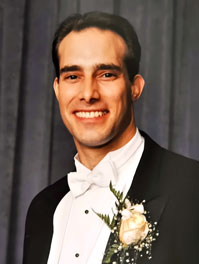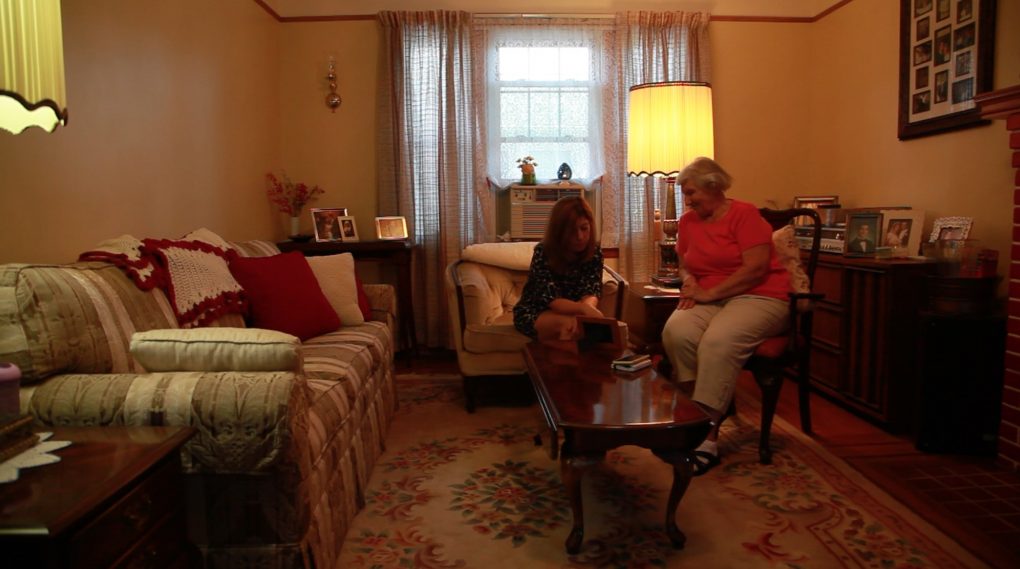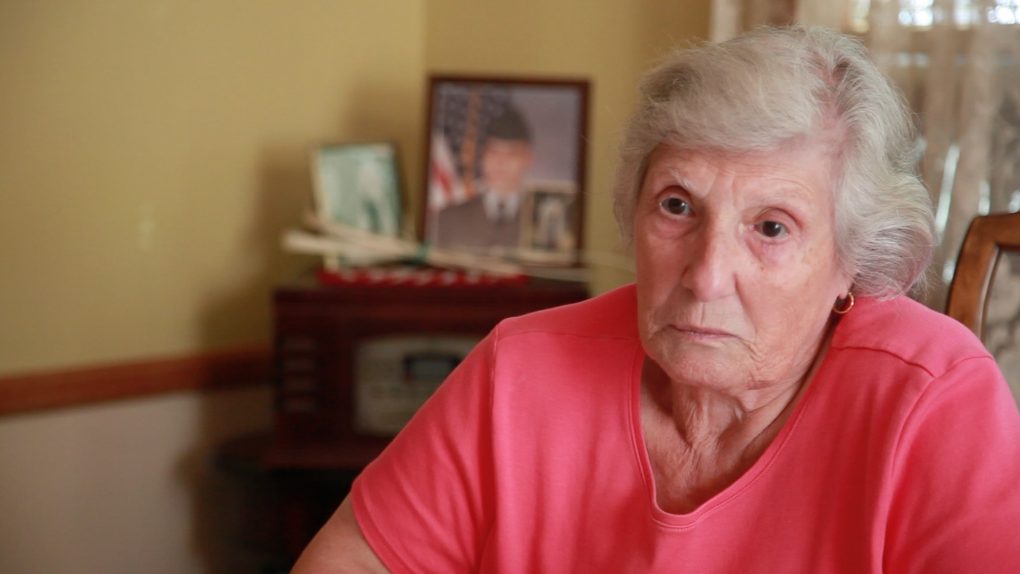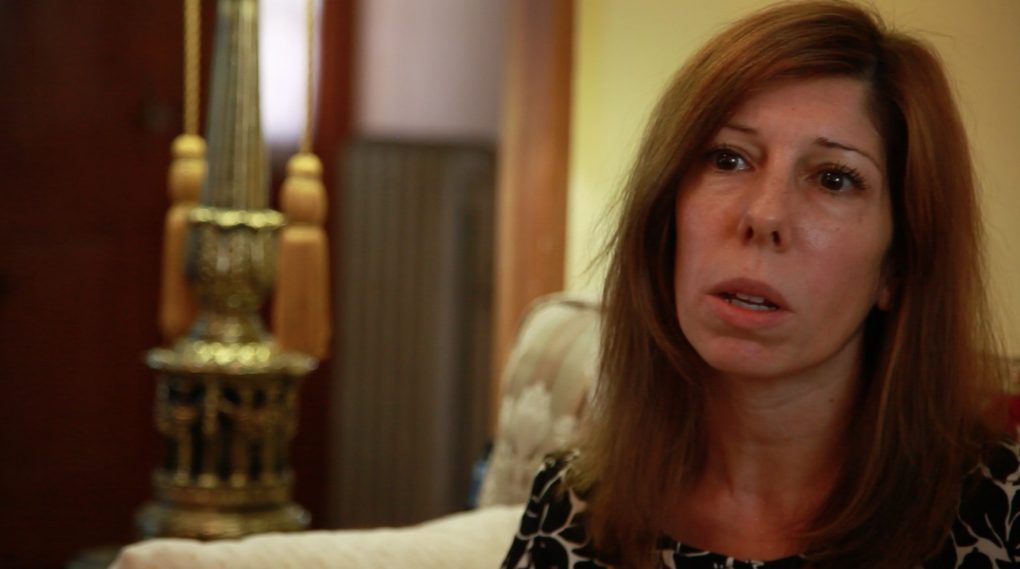“David was there, at that time, by chance, and he died because of something that had nothing to do with him. Like all the victims. He suffered and he passed away for something he had nothing to do with. For other people’s games of power,” tells us Emmelina De Feo, who lost her brother on September 11th, 2001 at the World Trade Center. Nothing was left of him, except for an ID.

No one could remember his phone number that morning. Yet, they knew it by heart. They had dialed it hundreds of times. That day, everything stopped suddenly. It happened on a Tuesday, on an ordinary day in September.
Emmelina was in her room. She was choosing what to wear and had her radio on. She was the first one to hear the news because all the programs were interrupted. A plane had hit a building: the North Tower of the World Trade Center. She ran down the wooden staircase screaming. She told her parents to turn on the TV. It wasn’t even nine. A column of thick, black smoke was coming out of the skyscraper. Her brother, David De Feo, worked at Ground Zero, on the 104th floor of the South Tower. No one knew what was going on.
Emmelina tried to call him, but the phone wasn’t working. “I left a message on the voice mail asking him to contact us. He did a minute later,” the sister tells La Voce di New York. Only the mother, Luisa, talked to David. “He told me: ‘Don’t worry, mom. Keep calm. I love you. There is nothing to worry about.’ I had the feeling that something weird was happening, it couldn’t be a mistake or an accident. I hung up, I turned around, and right after, I saw on TV the second plane hitting the tower. I knew I had lost him. In that moment, I understood he was gone. It was like something had hit me as well.”
My son is gone. Luisa often repeated this sentence, while she leaned on the table in the living room. Behind her, there are many pictures of David, in his army uniform, at his First Communion, at his wedding. He was a tall guy with dark eyes and a great smile. He was one of the 2,997 victims of that terrorist attack. He had started working at Ground Zero 5 years before. He died at 36. “He would have been 37 on October 12th. He was born on Columbus Day. He really was a special person,” the mother explains smiling. He had married an elementary school teacher a few years before, but they had no kids yet.
They had bought a house not long before and that day, David decided to go to work early: “He was there, at that time, by pure chance. In the afternoon, he was waiting for some domestic appliances he had ordered a couple of days before. He decided to start early to get out early,” Emmelina explains. David was born in New York and grew up in Queens, with his family of Italian origin. At his parents’ house, who are both originally from the Italian region of Campania, he spoke Italian.
The hours after the attack were unreal. “We realized we weren’t able to go to the city, so we stayed here, at home, trying to understand what had happened. And I think we understood even if we didn’t want to believe it. My husband, who was really sick at that time, kept on saying that David was a strong person and that he would have made it. But the way that plane hit the tower didn’t leave any way out for the people in the building,” Luisa continues.
Emmelina’s eyes are teary while she talks about her brother from the couch. “He was there, at that time, when he wasn’t supposed to be there, and he died for something he had nothing to do with. Just like all the victims. He suffered and he passed away for something he had nothing to do with, for some game of power of others.” The silence in the house is interrupted by Emmelina’s daughters playing. Nothing was found of David; not a piece of clothing nor a personal item. Only his ID Card was left. Sofia, his wife, keeps it and every year she goes back to Ground Zero.

Luisa, what do you remember of the hours after the attack?
LUISA’S ANSWER: “A great confusion. I didn’t even manage to call my other son, Claudio, who lived in Florida. Since neither planes nor trains were working, he came up by car. He left everything and drove here (ed: New York) for more than 15 hours. I saw him the morning after, getting out of the car in front of the house (ed: she gets emotional). He told me that they had never stopped, that no one had stopped them and that they wanted to be with us.”
Then, what happened?
“Then, we simply stayed together and made some other calls. We would listen carefully to Mayor Rudolph Giuliani’s directions, who was telling us what to do. There were a couple of days in which you remember and don’t remember a bunch of things. It was hard, really hard. We never went to bed. Not even my husband, who was seriously ill and had just had surgery.”
Who told his wife Sofia?
“I don’t know. I never asked her if she managed to talk to him: it was too private a matter. Anyway, we managed to contact her, but she didn’t know anything as well. We stayed with her three days. She went through some very hard times. She was out of control. We all were.”
Luisa, what kind of relationship do you have with her today?
“We kept in touch, but we don’t talk often. She has a family now, she has kids and we don’t want to overload her with emotions, because I am sure that when she sees me she remembers. She knows that when she wants to talk to me, she can pick up the phone and call me. She can do it anytime. I talk to her once or twice a year. She is really a great person. They loved each other.”
Did any of you go look for him?
“His siblings. They looked for him for days. Claudio and Emmelina, from what I recall, would go to Manhattan really early in the morning. They’d come back, dark in the face with no news. They would not say a thing of what they’d seen down there. I think they did it to protect us.”
Luisa, when did you understand that David was really gone?
“During the following nights I couldn’t sleep. I would stay up all night waiting for any news. The following Thursday (ed: two days later), at 4 am in the morning, I heard Mayor Giuliani saying: ‘There is not much more we can do. We need to start to take the bags for the corpses.’ God, when I heard those words I got crazy.”
What did you do?
“I was in the kitchen, my husband came to me. I ran outside the house, I went towards a church, but the church was closed. While I was walking I could smell something burning, something I still remember today. I was upset, even with the priest: how was it possible that the church was closed, I kept on saying. Anyway, someone then came to open it and while I came in I saw all that smoke. The service started. I had left my husband at home, because he was very sick and couldn’t move quick enough. However, soon after, I found him next to me (ed: she smiles). He came to see how I felt. Soon after, we went back.”
Was there someone waiting for you at home?
“Yes, some members of the family, some cousins, and many people, who came in and out. There were some of David’s friends who were asking for information. My cousin, who was a doctor at Lenox Hill Hospital, came with a book from Manhattan: it was a list of hospitals.”
Did he help you?
“I kept on asking him whether he thought that David was alive or not, if he knew what was happening, if he would have suffered. He knew we were looking for answers. I was so tired, so exhausted, that one night I fell asleep right away as I got to bed. I slept deeply. Then a voice, a very sweet voice, called me. I can still hear it: ‘Luisa.’ I swear, I thought it was God who was telling me: ‘Don’t worry.” It was hard. I had mixed feelings, I still do. I live with it. He’s always in my heart. And I miss him. It shouldn’t have happened, but it did, what can I do?”
What hurt the most?
“The fact that he was never found and that I couldn’t grieve for him. We go to Ground Zero. He’s somewhere down there.”

How do you feel seeing the images on TV, for example today?
“I can’t watch: I see them in my head every day. When other people talk about it, they don’t realize what I felt: for some people it’s history, for me it’s a personal matter. I would never forget. You can’t forget something like that.”
Do you go to Ground Zero every September 11th?
“At first, my husband and I went every year. Now he’s not with us anymore. When I go, I look around and I wonder where all those poor people ended up. While observing that hole I think that, maybe, my son is down there. However, I didn’t go for the past two years: it’s too much. I’d rather go when its calmer. Unfortunately, there are many people who don’t respect that place because they didn’t experience what I did. I stay away. I go when I feel the need to go.”
How do you feel now as a mother, Luisa?
“At first I was mad. I couldn’t stand to think about these people (ed: the terrorists). I wanted only to strangle them for the anger I had inside me. But through the years, I asked myself what I was doing to myself with this feeling. It didn’t help me and I had two other kids to love, who need me. I told myself I had to keep on living for them and for David’s memory, so it would always be alive.”
Emmelina, that morning you were the first to hear the news.
EMMELINA’S ANSWER: “Yes. I remember that the music stopped abruptly. I remember that, at first, there was some talk about an accident. Something similar had happened at the Empire State Building some years before. As soon as I turned on the TV, I didn’t even understand if the tower that was hit was where my brother worked.”
Why?
“I was scared and confused. There were flames everywhere and a lot of smoke. My mom had noticed after talking to him that David was too calm. She told me: ‘He was too calm. It doesn’t even seem like your brother’s voice.’ Still today, we actually don’t know how he managed to call us. Soon after his call, we couldn’t manage to reach anyone. Everything seemed to be disconnected. His tower was the first one to collapse, despite having been the second to be hit. (Ed: she cries). No one expected something like that: those two buildings were supposed to resist everything, they were built for that.”

What do you remember of those hours, Emmelina?
“It was like a punch in the stomach. You could feel it inside. It didn’t even seem true. We realized everything when the other tower fell as well. Then there was the Pentagon and the other plane fell or was hit. We would never know. It was a total shock: it was like someone was shooting with a gun.”
What do you mean?
“It was all so slow, like in slow motion, and, at the same time, so fast. Anyway, the only thing I can remember was that state of chaos and that stomach discomfort.”
Do you know how he spent his last moments?
“Unfortunately, I didn’t speak to him. I only left him a voice message. From what I could understand, he was next to a dear friend of his, with whom he worked. She was on the phone with her husband, who told us some time later that he could hear people screaming, ‘I don’t want to die.’ She was crying too. It seems like my brother said: ‘We need to go now.”
Do you think he knew how serious the matter was?
“I think he knew perfectly well what was going on. But he was a soldier and the training imparted to him a certain calm in situations of danger.”
Did any of his colleagues survive?
“No, I don’t think so. The people who weren’t there survived. He was there early and people who are alive today survived because they weren’t at work yet.”
His mother said you went to look for David, you and Claudio. What do you remember about that moment?
“It was an experience I will never forget. It was like going to war. There was a truck of armed soldiers in Manhattan. I had to go around with my passport to go in. All the public spaces were closed. The subway worked off and on. There were triages that welcomed all the involved families. They wouldn’t let us get closer and look for him. The only thing we could do was put up an announcement with our phone numbers on it. We looked for his body for days.”
Where did you look for him?
“We would spend the nights sleepless, because there was no way to contact the hospitals during the day. The lines were too busy. After midnight, my brother and I would call all the way to Pennsylvania or Boston. We tried to call all the facilities, because many wounded were taken there. That gave us hope.”
Why?
“Because on TV people were talking about missing people; there were people who had lost their memory from the shock. We held on to that. We thought he was in a coma, ended up in a hospital without identity. I was desperate, I was crying on the phone, because maybe the staff would tell us that no one had come. And I would start to scream out of anger and sadness. Very nicely, they would ask me not to cry. Everyone was desperate, even if they hadn’t lost anyone. Everyone was sad, deeply sad. I kept on smelling something burning for weeks. It was surreal.”
During those years, did you ever think he wasn’t dead?
“(Ed: she smiles). For a long time, we waited for a postcard or that maybe one day, after some years, he would come to the door. I know he is dead and I know he will never come back. But I didn’t see him. There is no grave site. It’s something that remained unresolved.”
What kind of person was your brother?
“(Ed: She smiles and seems relieved). He was 11 years older than me and I got to know him while growing up. He was like a second father to me. He was a joyful person, extremely intelligent, with a big heart. He was always there for everyone. He was a guy who loved to joke a lot. He loved winter. He was playful and would put on Christmas songs during the summer to make us laugh. Every time he walked into a room, his smile would light up everything.”
Was he proud of his origins?
“Yes, he was. He grew up speaking Italian, as all other members of this family. He was very proud of his identity and of who he was. He felt Italian.”
Would he often go back to Italy?
“When he was younger he would go back more often. He was very attached to his origins.”
Emmelina, have you ever feared forgetting him?
“Always.”

What do you fear the most now?
“I am scared to forget his voice, his face, his attitude, his gestures. The more the years go by the more you think about the fact that you will have no future with that person. We didn’t have kids at the same time and he wasn’t there when I got married. He has never seen my girls. Sometimes I am afraid to forget our childhood together. The person I used to remember many things about is not here anymore. He’s not the only one to be dead; a part of my life is as well. There are no more sudden calls to each other, no more laughter, no more holidays spent together. No more Christmases.”
Did you keep a good relationship with Sofia as well?
“Yes, we talk regularly. We write to each other and last year we met at Ground Zero. She was there already, with her husband (ed: the second one), in front of my brother’s name. David always remained very present in her life, even after the marriage. Her husband and kids know about him.”
16 years have gone by. What would you tell him today. What would you like to say?
“I would tell him that the world is not the one we knew anymore and that many things have changed. I would tell him that I miss him and I have missed him a lot. I would tell him I am sorry for him, who is not here anymore and who loved life so much.”
(Translation by Giulia Casati)











